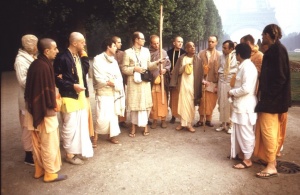SB 8.19.10

A.C. Bhaktivedanta Swami Prabhupada
TEXT 10
- evaṁ sa niścitya ripoḥ śarīram
- ādhāvato nirviviśe 'surendra
- śvāsānilāntarhita-sūkṣma-dehas
- tat-prāṇa-randhreṇa vivigna-cetāḥ
SYNONYMS
evam — in this way; saḥ — He (Lord Viṣṇu); niścitya — deciding; ripoḥ — of the enemy; śarīram — the body; ādhāvataḥ — who was running after Him with great force; nirviviśe — entered; asura-indra — O King of the demons (Mahārāja Bali); śvāsa-anila — through the breathing; antarhita — invisible; sūkṣma-dehaḥ — in his finer body; tat-prāṇa-randhreṇa — through the hole of the nostril; vivigna-cetāḥ — being very anxious.
TRANSLATION
Lord Vāmanadeva continued: O King of the demons, after Lord Viṣṇu made this decision, He entered the body of His enemy Hiraṇyakaśipu, who was running after Him with great force. In a subtle body inconceivable to Hiraṇyakaśipu, Lord Viṣṇu, who was in great anxiety, entered Hiraṇyakaśipu's nostril along with his breath.
PURPORT
The Supreme Personality of Godhead is already in the core of everyone's heart. Īśvaraḥ sarva-bhūtānāṁ hṛd-deśe 'rjuna tiṣṭhati (BG 18.61). Logically, therefore, it was not at all difficult for Lord Viṣṇu to enter Hiraṇyakaśipu's body. The word vivigna-cetāḥ, "very anxious," is significant. It is not that Lord Viṣṇu was afraid of Hiraṇyakaśipu; rather, because of compassion, Lord Viṣṇu was in anxiety about how to act for his welfare.